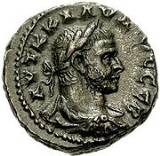
Claudius II
Overview
Claudius II commonly known as Claudius Gothicus, was Roman Emperor
from 268 to 270. During his reign he fought successfully against the Alamanni
and scored a crushing victory against the Goths
at the Battle of Naissus
. He died after succumbing to a smallpox plague that ravaged the provinces of the Empire.
Claudius' origin is uncertain. Born on May 10, 213, he was either from Sirmium
in Pannonia Inferior or from Naissus Dardania (in Moesia Superior).
Claudius had served with the Roman army for all his adult life, making his way up the military hierarchy until the Emperor Gallienus
made him the commander of his elite cavalry
force.
Roman Emperor
The Roman emperor was the ruler of the Roman State during the imperial period . The Romans had no single term for the office although at any given time, a given title was associated with the emperor...
from 268 to 270. During his reign he fought successfully against the Alamanni
Alamanni
The Alamanni, Allemanni, or Alemanni were originally an alliance of Germanic tribes located around the upper Rhine river . One of the earliest references to them is the cognomen Alamannicus assumed by Roman Emperor Caracalla, who ruled the Roman Empire from 211 to 217 and claimed thereby to be...
and scored a crushing victory against the Goths
Goths
The Goths were an East Germanic tribe of Scandinavian origin whose two branches, the Visigoths and the Ostrogoths, played an important role in the fall of the Roman Empire and the emergence of Medieval Europe....
at the Battle of Naissus
Battle of Naissus
The Battle of Naissus was the defeat of a Gothic coalition by the Roman Empire under Emperor Gallienus near Naissus...
. He died after succumbing to a smallpox plague that ravaged the provinces of the Empire.
Claudius' origin is uncertain. Born on May 10, 213, he was either from Sirmium
Sirmium
Sirmium was a city in ancient Roman Pannonia. Firstly mentioned in the 4th century BC and originally inhabited by the Illyrians and Celts, it was conquered by the Romans in the 1st century BC and subsequently became the capital of the Roman province of Lower Pannonia. In 294 AD, Sirmium was...
in Pannonia Inferior or from Naissus Dardania (in Moesia Superior).
Claudius had served with the Roman army for all his adult life, making his way up the military hierarchy until the Emperor Gallienus
Gallienus
Gallienus was Roman Emperor with his father Valerian from 253 to 260, and alone from 260 to 268. He took control of the Empire at a time when it was undergoing great crisis...
made him the commander of his elite cavalry
Cavalry
Cavalry or horsemen were soldiers or warriors who fought mounted on horseback. Cavalry were historically the third oldest and the most mobile of the combat arms...
force.

